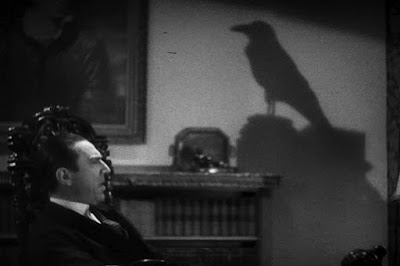One of the many Edgar Allan Poe adaptations that aren't really Edgar Allan Poe adaptations, The Raven is a dark, tense, funny, occasionally silly, and consistently entertaining twist on the mad doctor story that reunites heavy hitters Bela Lugosi and Boris Karloff (billed only as KARLOFF: all caps; I always get a kick out of the handful of credit sequences giving him this billing) and gets the job done in 62 minutes in classic 1930s fashion. I had a grand old time watching it.
Lugosi plays Richard Vollin, a brilliant surgeon who has retired from practice to do "research." This research consists of letting his Poe obsession run wild, as he has recreated several torture devices from Poe's short stories and poems in a secret room hidden behind a fake bookshelf. He also keeps a large stuffed raven near his desk and frequently recites excerpts from the poem named after the bird.
When interpretive dancer Jean Thatcher (Irene Ware) is gravely injured in a car accident, her surgeons hit a brick wall. Her father, Judge Thatcher (Samuel S. Hinds), and her fiancé, Dr. Jerry Halden (Lester Matthews), implore Vollin to come out of retirement and save Jean. After multiple refusals, Vollin finally relents when his ego gets enough of a massage, and he brings Jean back from the edge of death. When the recovered Jean becomes a regular visitor at Vollin's abode, the mad doctor falls in love with her, a love that only intensifies when Jean creates a sold-out interpretive dance performance based on "The Raven" in gratitude. Judge Thatcher recognizes Vollin's intentions and gives him the business about leaving his engaged daughter alone, which does not sit well with the mad doc, who loves torture even more than he loves Jean and the work of Poe.
You may think Jean a little naive for not realizing how insane Vollin is, but her doctor fiancé is one of those classic '30s condescending milquetoast duds who doesn't deserve such a vibrant wife. No wonder Jean gets a little infatuated with a weird but brilliant guy who won't shut the eff up about Poe.
Where's KARLOFF, you say? He shows up as escaped criminal Edmond Bateman, on the lam after killing some prison guards and a bank teller. He wants Vollin to surgically modify his appearance, but Vollin won't do it until Bateman agrees to help him with his own devious plans. Bateman is capable of some pretty intense violence, but he's also a morally conflicted man with a conscience, which leads to complications and actions from both men that I won't reveal.
Things get really wild when all the characters converge at a weekend soiree at Vollin's home. The tone jumps back and forth between goofy comic relief, truly anxiety-inducing suspense, and some pretty gnarly and twisted torture-related biz, but workhorse journeyman director Lew Landers (back when he was directing under his real name of Louis Friedlander) keeps control of it all with style and skill. (Albert S. D'Agostino's eye-popping art direction also deserves a mention.)
Landers died in his early sixties, but still managed to notch 176 directing credits between the early '30s and the early '60s in both film and television in nearly every genre and subgenre. He directed 12 feature films in 1942 alone. His final film was a horror movie, 1963's Terrified, released the year after his death.
Lugosi and Karloff don't have the complex material in The Raven that they had in Ulmer's The Black Cat, but their iconic status and wildly different acting styles complement each other nicely. Lugosi is delightfully hammy and darkly comedic, while Karloff is subtler and sadder, bringing out the pathos and conflicting emotions in his wounded character (though he does get to unleash a couple of Frankenstein's monster-esque grunts when he gets mad). Instead of clashing, the differing approaches gel nicely. This is a solid '30s horror film, well worth your time.
































